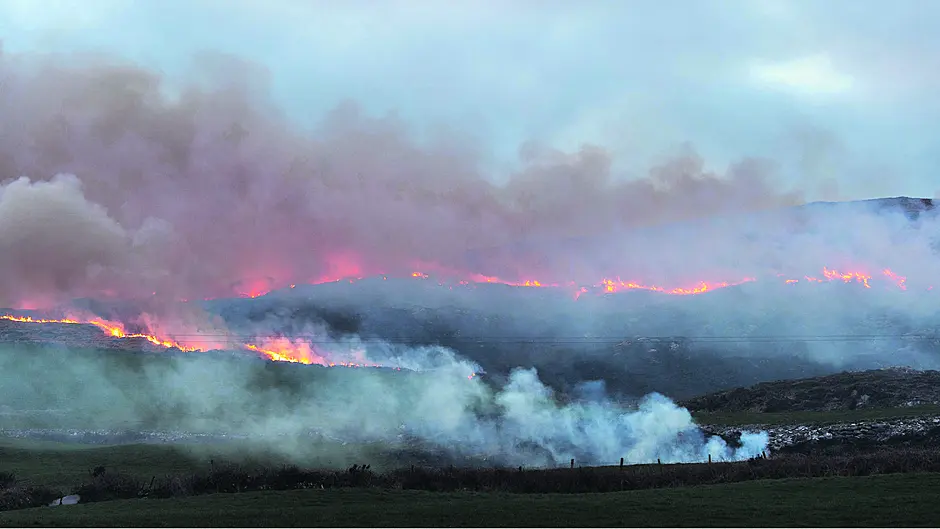Goleen resident Birgit Eder was shocked to receive a bill for over €2,000 for the fire crews who helped combat a gorse fire near her home recently. But it’s not just the financial cost that angers her. It’s the health and environmental costs, too.
THIS year’s February gorse fires went out of control like never before, and so did the horrendous bills unjustifiably sent out to people who only did their civil duty.
That brought up a lot of thoughts and questions around the issue of gorse fires for me and the many being affected on Mizen peninsula – like my neighbours Pika and Dan Ballard.
They had to flee their home until next morning, because the fire was surrounding her house. Pika asked me to convey some of her thoughts, along with my own, for this article.
It should be noted that we all pay a high price for these fires in many ways.
Money-wise as taxpayers, for a start.
I have no doubt the gorse fires result in tremendous costs for the fire brigade, that itself is a community service.
These precious resources should not be exploited or misused, or wasted on fires that have been started deliberately and are let go out of control without anyone taking any responsibility for them. Bills should go to the ones who start them – not the ones who face and fight them.
We also pay with our health, because those directly affected by the fires suffer through smoke inhalation and are traumatised by the fear of losing their homes, and possibly, lives.
Especially for those whose homes are adjacent to commonage, it creates a huge unease and fear of not knowing when such a fire will be deliberately started again.
Often they are started late in the day or at night when you could be in bed and not realising the hill beside you is on fire – something I myself have experienced. When windows are open, a huge amount of smoke comes in and it is only a matter of time before a terrible tragedy will occur. We should also not forget how horrified children and pets are by these fires.
Nature, of course, suffers horrendously. The landscape becomes a mass grave for all the small creeping and nesting animals on the ground, who are not able to flee the fires. Like meadow pipits, who this year, were already nesting due to the mild weather.
Wintering snipe, Irish hare and many other mammals lost their habitats. Insects, frogs and the Irish black slug were completely wiped out where the fires raged.
Being proud of the certified West Cork honey, sadly beehives were also demolished by the smoke and heat. So the natural chain is out of balance by brutally being disrupted.
The enviroment suffers, too, as a massive amount of CO2 is being released during such burning where part of the vegetation is still wet.
The gorse is fresh wood full of oils.
It is very disheartening to realise that the perpetrators of these fires don’t take the environment into account at all.
And as for material damage – water pipes, fence posts and more often have to be replaced.
While farmers might have insurance for this, a lot of private properties do not.
Then there is the loss of business to people who have their houses rented out during this time and have had to evacuate traumatised guests who may never want to return after such an event.
And last but not least, the beautiful landscape is turned into an apocalyptic scene for a while. Not a good look for tourists and certainly not for those of us living here who have to look at it every day until it recovers.
Do we really want to continue to accept all of these consequences of gorse fires?
In the past controlled gorsefires have made sense, as animals were grassing on open land. But this is no longer the case. These massive and out-of-hand fires have no real use – except to damage health, property and nature.
They need to be banned. Now.








